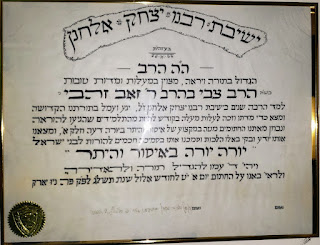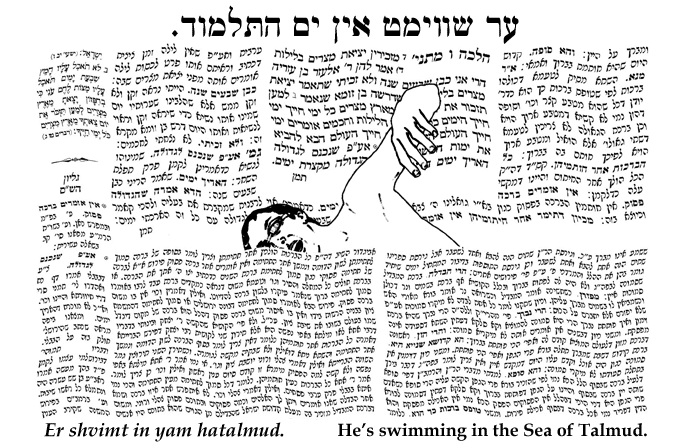At its establishment, Chief Rabbi Herzog prescribed that the Prayer for the State of Israel be recited after the Torah reading in the synagogue on Sabbaths and Festivals.
This was Jewish prayer mistake number one.
He incorrectly mandated that this particular recitation remain unimportant, peripheral, second rate, and really not a part of the
davening. It was a quick and dirty innovation. And it was wrong.
- First off, on account of its placement, the prayer is often recited by the gabbai, not the hazzan.
- Second, the prayer is frequently recited in a monotone, not chanted, and from the side of the bimah, not from the front and center of the synagogue.
- Third, the prayer is recited after the Torah reading and before the Musaf service - in a liminal area - between the established parts of the davening. It seems to me to be placed in a tertiary context that makes it even less prominent in the liturgy than the personal mesheberach blessings recited for individuals who receive aliyot to the Torah.
You don't have to be an expert in Jewish liturgy to conclude that this prayer is generally presented as an afterthought, recited quickly, and that it has been pasted in to our
davening. In fact in many synagogues, the text is not printed in the prayerbook, It is
actually pasted into the back cover of the
siddur.
It is high time for some prayer-book reform.
We ought to be inserting a real prayer for the modern state of Israel into the crux of the actual prayer services of our tradition. We perhaps should have the chazzan chant it properly from the bimah. We perhaps should have the congregation join in responsively or together with the chazzan in singing the prayer with joy.
Perhaps we should say this prayer three times a day - every day - in our Amidah or after the Alenu.
For sure we must not equivocate about the State of Israel. It is real.
We live in Teaneck. Most of our friends have been to Israel. Most of our community members have been inspired by the State and its history. We ourselves have lived there and visited there many times.
The State of Israel is a factual, powerful, pervasive, long-lasting creator of religious moods and motivations.
Yes it is time to promote the thanksgiving, praise and petition concerning the modern State of Israel as a real and central theme of all of our synagogue prayers.
It is time to correct the error of the former Chief Rabbi and promote the Prayer for the State of Israel to a much more prominent place in our liturgy.
At its establishment, Chief Rabbi Herzog prescribed that the Prayer for the State of Israel contain the phrase,
"the beginning of the blossoming our redemption."
This was Jewish prayer mistake number two.
The State of Israel
is the redemption of the Jewish people. Not the "beginning of the redemption." Not the "beginning of the blossoming of the redemption."
It is the actual, historical, theological, political, social and cultural redemption of the Jewish people.
Anyone who denies this is not in touch with reality. Anyone who hedges about it with language that is wishy-washy and ambivalent and preliminary - is just a redemption denier.
We Jews of all denominations must say the Prayer for the State of Israel more frequently, more centrally and more forcefully.
Meanwhile, we do not know how to cure these errors. Here for information purposes, is the current flawed prayer in translation.
Our Father in Heaven, Rock and Redeemer of the people Israel; Bless the State of Israel -- the beginning of the blossoming our redemption. Shield it with Your love; spread over it the shelter of Your peace. Guide its leaders and advisers with Your light and Your truth. Help them with Your good counsel. Strengthen the hands of those who defend our Holy Land. Deliver them; crown their efforts with triumph. Bless the land with peace, and its inhabitants with lasting joy.
And visit all our Brethren of the house of Israel, in all the lands where they are scattered, and bring them rapidly to Zion, Your city and to Jerusalem, where Your name lives, as it says in the Torah of Moses, Your servant: ‘Even if your dwelling is at the end of the sky, God will congregate you from there, and bring you from there, and will bring you toward the land that Your forefathers inherited and you will inherit it.’ Dedicate our hearts to love and worship Your name and to keep all that is in Your Torah, and send us the son of David, the Messiah of Your justice, to redeem those who wait for Your salvation. Appear with the glory and the pride of Your strength, in front of all the inhabitants of the Universe, and all those who have breath will say: “The God of Israel is the King, and He reigns over all.” Amen.
[Blogged previously in 4/2007.]






